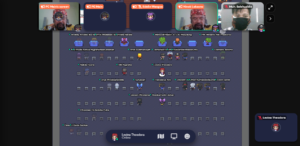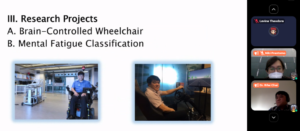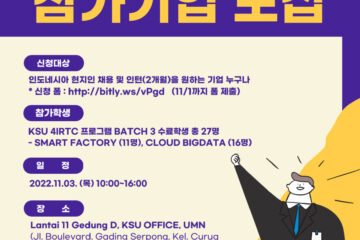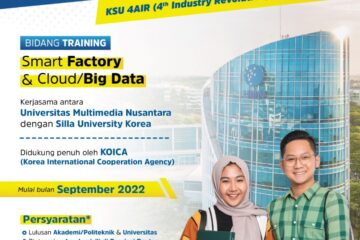Tangerang – As a form of commitment to the development of Information Communication Technology (ICT), Multimedia Nusantara University (UMN) since 2011 has held a regular international meeting in the form of a conference called CONMEDIA-ICONSONICS. This year is the sixth CONMEDIA conference and the second ICONSONICS conference. Carrying the theme “Unlocking The Potential of Smart Digital Technology and Multimedia for Sustainable Development” as a form of response to technology that is not only oriented to the current generation, but also as a sustainable development effort for future generations.
“The progress we want to achieve is progress that ensures sustainability, especially in development. In this dynamic digital environment, I am sure you will find a lot of potential and possibilities to make other advances in knowledge that are beneficial to mankind,” said UMN Chancellor, Dr. Ninok Leksono, M.A. in his speech.
The first international ICT conference held by UMN was named the International Conference on New Media Studies (CONMEDIA). This event is a forum that forms an international network in helping researchers to disseminate research results in an international environment. This forum is also a meeting room for ICT practitioners in discussing and interacting to increase their respective insights and knowledge.
In 2017, UMN also succeeded in organizing another international conference with topics that were different from CONMEDIA but complemented each other. This conference is called the International Conference On Smart Cities, Automation & Intelligent Computing Systems (ICON-SONICS). Since then, CONMEDIA and ICON-SONICS have been merged into one international conference event which is regularly held every year.

This year, CONMEDIA & ICONSONICS 2021 is held again to strengthen, strengthen, and expand the network. Also this year, CONMEDIA & ICONSONICS 2021 collaborates with the Institute of Electrical and Electronics Engineers (IEEE) Indonesia Section to facilitate the publication of research papers in the IEEEXplore network. This event also collaborates with STMIK STIKOM Indonesia (STIKI) Denpasar and the Association of Informatics and Computer Science Universities (APTIKOM).
“CONMEDIA & ICONSONICS 2021 is expected to be able to absorb more international research papers than the previous conference, and of course with a more classy scientific spectrum content. In addition, practitioners, academics, as well as government institutions can also benefit greatly from smart digital technology and multimedia,” said the Chief Executive, Dr. eng. Niki Prastomo who is also the Dean of the Faculty of Technology and Informatics UMN.
The scientific fields of the CONMEDIA & ICONSONICS 2021 conference are divided into two. CONMEDIA’s scientific fields include applications, mobile technology, interactive media design, business intelligence and management, strategic information systems, computational science and technology, and embedded systems and communication. Meanwhile, ICONSONIC covers the fields of science: smart cities, automations, and intelligent computing systems.
Niki explained, the development of smart digital technology and multimedia was closely related to the development of technologies that carried the Industrial Revolution 4.0 and Digital Transformation. Digital transformation itself refers to a process that uses digital technology to create new innovations or modify business processes, culture, and consumer experiences to deal with changing business and market needs. Furthermore, economist Klaus Schwab, Founder and Executive Chairman of the World Economic Forum explained that this fourth industrial revolution will affect how we live and work and will be different in scale, scope and complexity compared to previous revolutions. This is what underlies the importance of building technology that supports sustainable development.
“Technology developments currently have a fast pace, both from applications, system intelligence, automation, internet infrastructure, big data, and multimedia. The issue of sustainability is an important point that needs to be considered by academics, industry practitioners, and stakeholders. It is hoped that from this topic, the benefits and impacts of technological developments can be felt by future generations,” continued Niki, explaining her hopes for this online conference.
Management of technology that supports sustainable development requires good collaboration from many parties, including academics and industry practitioners to optimize digital transformation. Discussion and discussion of creative ideas that explore the potential of digital and multimedia technology is needed in order to achieve a comprehensive understanding. That way, the benefits can be felt by various parties and can be an advantage that is not only enjoyed by the current generation, but also for generations to come.

This international conference will be held for two days on October 12-13, 2021. In addition to conferences and presentations of scientific papers, a keynote session is also scheduled with Prof. Dr. Ir. D.A.I Marpaung from the University of Twente, The Netherlands; Dr. Rifai Chai from the University of Technology, Australia; Jessy Abdurrahman, B. Comp. Sci. (Hon.), CEO of Zi.Care; and Irawan Harahap, S.T., M.M. who is Sinar Mas Land Chief of Digital Tech Ecosystem & Development. The speakers conveyed how technological innovations such as Big Data and Artificial Intelligence (AI) were included in social issues or challenges and were in line with the concept of Society 5.0.
“90% of the world’s data was created in just the last two years, so we are truly in the information age, data age, and communication era,” said Prof. Marpaung during the presentation. This big increase related to information which is then referred to as Big Data.
Each speaker presented their research, such as Rifai which combines Artificial Intelligence (AI) and Brain-Computer Interface (BCI). AI and BCI will utilize technology by using brain signals to control equipment that supports human activities. Specifically, this technology is prepared for persons with disabilities. At a different time, Jessy presented his research on the digitization of medical records (Electronic Medical Records). This digitization system was created so that a patient’s medical record can be centralized and integrated with WHO standards. The hope is that every patient who will move hospital does not have to bother with the medical record file at the previous hospital. Unlike Rifai and Jessy, Irawan presented about the development of BSD City, which is located in Tangerang, into a smart city. Smart city is a digital-based service for better city and economic management, quality citizens’ lives, and a healthy environment for future generations.
Held online through the Gather.town application, this event is able to provide a new experience and more interaction in online conferences. Participants gave a positive response to the committee’s initiative in choosing this application.
“The Gather application is expected to provide a more flexible networking experience, such as the experience at an offline conference. Participants can create their own avatar and appear to be present and gathered in one place. A little treat the longing to gather directly. In parallel, participants can meet each other, discuss their needs in one conference room without disturbing other participants,” concluded Niki.
by Stephanus Novi | UMN News Service




0 Comments